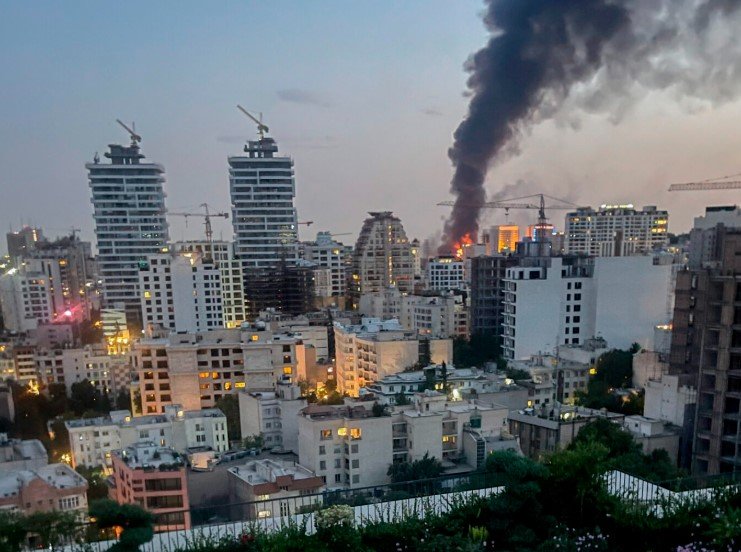An Iranian state TV broadcast was dramatically cut short Monday night after an Israeli missile strike shook the studio mid-air, sending the visibly terrified anchor scrambling off-camera. The attack came amid escalating hostilities that have now entered their fourth day, with both Iran and Israel intensifying strikes and showing no signs of backing down.
As debris clouded the airwaves and screens across Iran went dark for a moment, the war felt more personal, more real—and dangerously unpredictable.
A Live Broadcast Turned Battlefield
It started like any other late-night news segment. A female anchor, stern yet composed, addressed the nation from Iran’s national broadcaster in Tehran. But within minutes, the calm was pierced by the unmistakable sound of a nearby explosion.
She paused. Her eyes darted off-camera. “We are hearing the sound of aggression against the homeland,” she said, her voice shaking. Then — a second, sharper blast. Dust swirled into the studio like smoke in a burning house. The screen behind her flickered and cracked.
In the next frame, the anchor was gone.
Just like that, the live feed cut to archived footage of Supreme Leader Ayatollah Khamenei speaking at a military rally last year.

Israel Targets Tehran’s Core Infrastructure
Israeli defense officials were quick to confirm the strike. The missile had hit within the heavily guarded central district of Tehran, home to government buildings, military installations, and the Islamic Republic of Iran Broadcasting (IRIB) headquarters. It’s a densely packed area, with more than 330,000 residents, three hospitals, and the nation’s police command center.
General Effie Defrin, Israel’s military spokesperson, claimed full aerial control over Tehran’s skies. His words were blunt: “We are eliminating their command, control, and communications. The Iranian propaganda and incitement mouthpiece is on its way to disappearing.”
That “mouthpiece,” in Israel’s eyes, includes IRIB. Destroying it wasn’t just about silencing a voice. It was symbolic—cutting off the state’s narrative at the source.
Panic, Power Cuts, and a City on Edge
Tehran didn’t sleep Monday night.
Residents reported blackouts following the strikes. Phone lines in some areas dropped. Videos flooded X (formerly Twitter), showing shattered windows, frightened civilians, and long lines at gas stations. Some clips appeared to show what looked like emergency convoys speeding through the streets.
One woman on social media posted: “My daughter was watching cartoons. Suddenly there was dust everywhere. Then the screen just went black. She asked, ‘Did the TV die?’ I didn’t know how to answer.”
For many, it was more than just a missile—it was a reminder that nowhere was safe now.
Mounting Death Toll and Evacuation Orders
The situation has spiraled fast. What began as retaliatory strikes last Friday has now mushroomed into full-scale operations from both sides.
On Monday morning, Iran fired another barrage of missiles toward northern Israel. At least eight people were killed. Israel’s response was immediate and massive.
Key updates from military briefings:
-
Over 120 missile launchers in Iran were hit, according to Israeli officials
-
Nearly one-third of Iran’s short-range arsenal is said to be destroyed
-
Evacuation alerts were issued for central Tehran, urging people to flee
That last point matters. It’s rare—almost unprecedented—for a nation to tell civilians in a capital city of 9 million to evacuate.
Trump: “They Should Talk Before It’s Too Late”
As the missiles flew, so did the politics. At the G7 Summit in Canada, U.S. President Donald Trump broke away from scheduled meetings to issue a statement.
“I’d say Iran is not winning this war,” he told reporters. “And they should talk. And they should talk immediately before it’s too late.”
He didn’t elaborate on what “too late” meant. But given recent U.S. intelligence reports that show Iran enriching uranium at 60%—dangerously close to weapons-grade—Washington appears genuinely concerned.
A White House aide confirmed to Reuters that Trump had not signed the final G7 joint statement on Iran. Reportedly, he wanted stronger language.
Political Spin Meets Real War
There’s another layer to this. Iran’s leadership has long used media, especially IRIB, as a tool to frame war narratives. Now, that very outlet is under attack.
Inside Iran, it’s being portrayed as martyrdom—an attack on national pride.
Outside Iran, analysts are seeing a different story. Here’s how global headlines framed the strike:
| Country | Headline |
|---|---|
| UK | “Israel Targets Tehran TV Station in Direct Hit” – The Guardian |
| US | “Live War: Israeli Missile Cuts Iranian Broadcast Mid-Air” – NYT |
| India | “Anchor Runs, Camera Cuts: Iran State TV Bombed” – Indian Express |
| Israel | “Truth Strikes Back: IRIB Facility Hit” – Jerusalem Post |
Perceptions, clearly, are as polarized as ever.
What Now? No One Knows.
There’s no roadmap for what’s coming next. The back-and-forth bombings, the collapsing diplomacy, and the sheer speed of escalation have left diplomats scrambling and civilians terrified.
Tehran has said it won’t back down. Israel insists it won’t stop until Iran ceases all military provocations.
And somewhere in the middle of it all, people—real people—are just trying to live.
